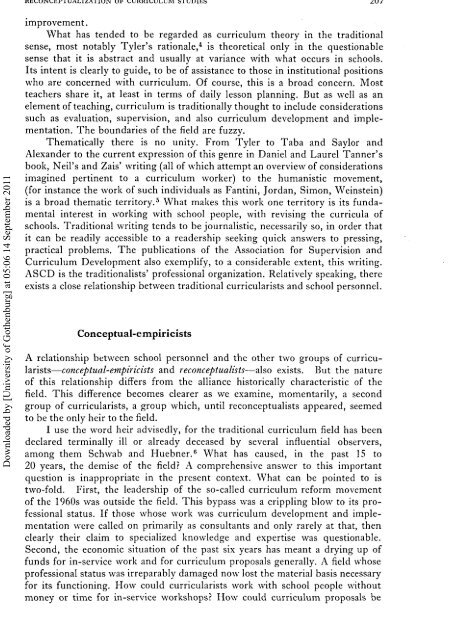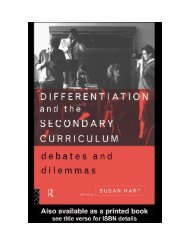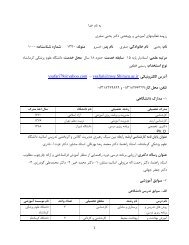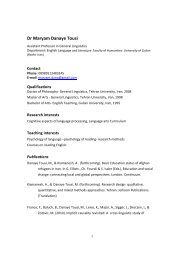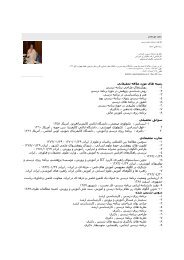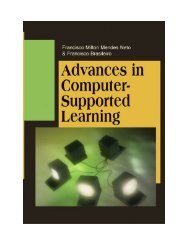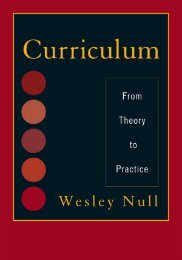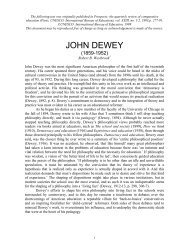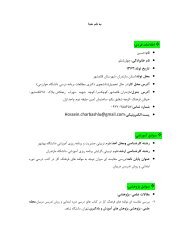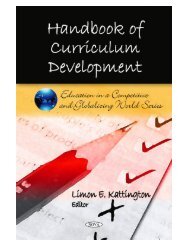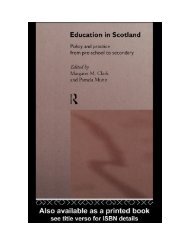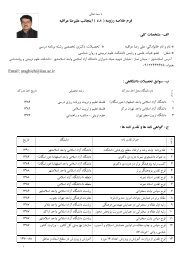The Reconceptualisation of Curriculum Studies
The Reconceptualisation of Curriculum Studies
The Reconceptualisation of Curriculum Studies
You also want an ePaper? Increase the reach of your titles
YUMPU automatically turns print PDFs into web optimized ePapers that Google loves.
RECONCEPTUALIZATION OF CURRICULUM STUDIES 207<br />
Downloaded by [University <strong>of</strong> Gothenburg] at 05:06 14 September 2011<br />
improvement.<br />
What has tended to be regarded as curriculum theory in the traditional<br />
sense, most notably Tyler's rationale, 4 is theoretical only in the questionable<br />
sense that it is abstract and usually at variance with what occurs in schools.<br />
Its intent is clearly to guide, to be <strong>of</strong> assistance to those in institutional positions<br />
who are concerned with curriculum. Of course, this is a broad concern. Most<br />
teachers share it, at least in terms <strong>of</strong> daily lesson planning. But as well as an<br />
element <strong>of</strong> teaching, curriculum is traditionally thought to include considerations<br />
such as evaluation, supervision, and also curriculum development and implementation.<br />
<strong>The</strong> boundaries <strong>of</strong> the field are fuzzy.<br />
<strong>The</strong>matically there is no unity. From Tyler to Taba and Saylor and<br />
Alexander to the current expression <strong>of</strong> this genre in Daniel and Laurel Tanner's<br />
book, Neil's and Zais' writing (all <strong>of</strong> which attempt an overview <strong>of</strong> considerations<br />
imagined pertinent to a curriculum worker) to the humanistic movement,<br />
(for instance the work <strong>of</strong> such individuals as Fantini, Jordan, Simon, Weinstein)<br />
is a broad thematic territory. 5 What makes this work one territory is its fundamental<br />
interest in working with school people, with revising the curricula <strong>of</strong><br />
schools. Traditional writing tends to be journalistic, necessarily so, in order that<br />
it can be readily accessible to a readership seeking quick answers to pressing,<br />
practical problems. <strong>The</strong> publications <strong>of</strong> the Association for Supervision and<br />
<strong>Curriculum</strong> Development also exemplify, to a considerable extent, this writing.<br />
ASCD is the traditionalists' pr<strong>of</strong>essional organization. Relatively speaking, there<br />
exists a close relationship between traditional curricularists and school personnel.<br />
Conceptual-empiricists<br />
A relationship between school personnel and the other two groups <strong>of</strong> curricularists—conceptual-empiricists<br />
and reconceptualists—also exists. But the nature<br />
<strong>of</strong> this relationship differs from the alliance historically characteristic <strong>of</strong> the<br />
field. This difference becomes clearer as we examine, momentarily, a second<br />
group <strong>of</strong> curricularists, a group which, until reconceptualists appeared, seemed<br />
to be the only heir to the field.<br />
I use the word heir advisedly, for the traditional curriculum field has been<br />
declared terminally ill or already deceased by several influential observers,<br />
among them Schwab and Huebner. 6 What has caused, in the past 15 to<br />
20 years, the demise <strong>of</strong> the field? A comprehensive answer to this important<br />
question is inappropriate in the present context. What can be pointed to is<br />
two-fold. First, the leadership <strong>of</strong> the so-called curriculum reform movement<br />
<strong>of</strong> the 1960s was outside the field. This bypass was a crippling blow to its pr<strong>of</strong>essional<br />
status. If those whose work was curriculum development and implementation<br />
were called on primarily as consultants and only rarely at that, then<br />
clearly their claim to specialized knowledge and expertise was questionable.<br />
Second, the economic situation <strong>of</strong> the past six years has meant a drying up <strong>of</strong><br />
funds for in-service work and for curriculum proposals generally. A field whose<br />
pr<strong>of</strong>essional status was irreparably damaged now lost the material basis necessary<br />
for its functioning. How could curricularists work with school people without<br />
money or time for in-service workshops? How could curriculum proposals be


